
Ernst Theodor Amadeus Hoffmann was a German Romantic author of fantasy and Gothic horror, a jurist, composer, music critic and artist. His stories form the basis of Jacques Offenbach's opera The Tales of Hoffmann, in which Hoffmann appears as the hero. He is also the author of the novella The Nutcracker and the Mouse King, on which Pyotr Ilyich Tchaikovsky's ballet The Nutcracker is based. The ballet Coppélia is based on two other stories that Hoffmann wrote, while Schumann's Kreisleriana is based on Hoffmann's character Johannes Kreisler.
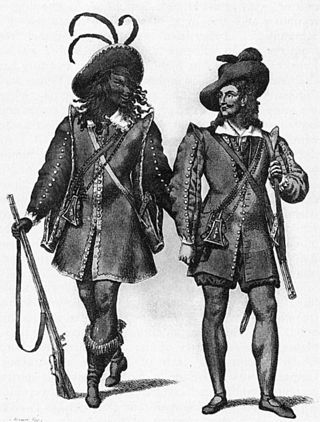
Der Freischütz is a German opera with spoken dialogue in three acts by Carl Maria von Weber with a libretto by Friedrich Kind, based on a story by Johann August Apel and Friedrich Laun from their 1810 collection Gespensterbuch. It premiered on 18 June 1821 at the Schauspielhaus Berlin. It is considered the first German Romantic opera.
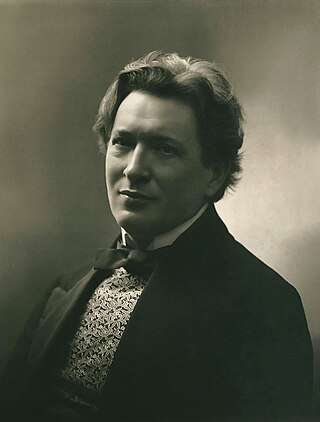
Ferruccio Busoni was an Italian composer, pianist, conductor, editor, writer, and teacher. His international career and reputation led him to work closely with many of the leading musicians, artists and literary figures of his time, and he was a sought-after keyboard instructor and a teacher of composition.
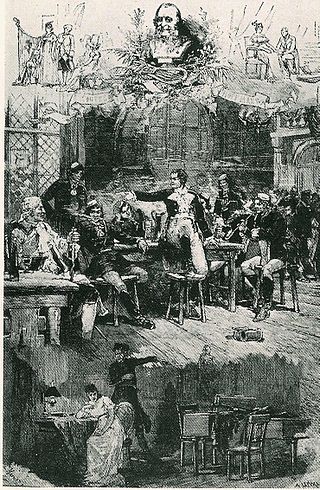
The Tales of Hoffmann is an opéra fantastique by Jacques Offenbach. The French libretto was written by Jules Barbier, based on three short stories by E. T. A. Hoffmann, who is the protagonist of the story. It was Offenbach's final work; he died in October 1880, four months before the premiere.

The Land of Smiles is a 1929 romantic operetta in three acts by Franz Lehár. The German language libretto was by Ludwig Herzer and Fritz Löhner-Beda. The performance duration is about 100 minutes.

The Fantasy on Themes from Mozart's Figaro and Don Giovanni, S.697, is an operatic paraphrase for solo piano by Franz Liszt, based on themes from two different Mozart's operas: The Marriage of Figaro, K.492 and Don Giovanni, K.527.

Kreisleriana, Op. 16, is a composition in eight movements by Robert Schumann for solo piano, subtitled Phantasien für das Pianoforte. Schumann claimed to have written it in only four days in April 1838 and a revised version appeared in 1850. The work was dedicated to Frédéric Chopin, but when a copy was sent to the Polish composer, "he commented favorably only on the design of the title page".

Doktor Faust is an opera by Ferruccio Busoni with a German libretto by the composer, based on the myth of Faust. Busoni worked on the opera, which he intended as his masterpiece, between 1916 and 1924, but it was still incomplete at the time of his death. His pupil Philipp Jarnach finished it. More recently, in 1982, Antony Beaumont completed the opera using sketches by Busoni that were previously thought to have been lost. Nancy Chamness published an analysis of the libretto to Doktor Faust and a comparison with Goethe's version.
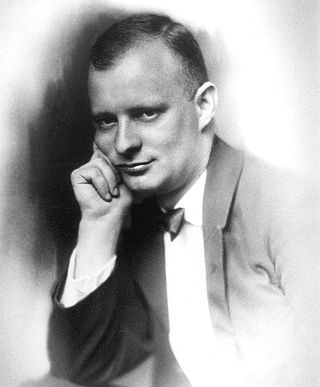
Cardillac, Op. 39, is an opera by Paul Hindemith in three acts and four scenes. Ferdinand Lion wrote the libretto based on characters from the short story Das Fräulein von Scuderi by E. T. A. Hoffmann.

Der Templer und die Jüdin is an opera in three acts by Heinrich Marschner. The German libretto by Wilhelm August Wohlbrück was based on a number of intermediate works based in turn on Walter Scott's 1819 novel Ivanhoe.

Olimpie is an opera in three acts by Gaspare Spontini. The French libretto, by Armand-Michel Dieulafoy and Charles Brifaut, is based on the play of the same name by Voltaire (1761). Olimpie was first performed on 22 December 1819 by the Paris Opéra at the Salle Montansier. When sung in Italian or German, it is usually given the title Olimpia.

Die Harmonie der Welt is an opera in five acts by Paul Hindemith. The German libretto was by the composer.

Undine is an opera, with spoken dialogue, in three acts by the German composer and author E. T. A. Hoffmann. The libretto, by Friedrich de la Motte Fouqué, is based on his own story Undine. It received its premiere at the Königliches Schauspielhaus in Berlin on 3 August 1816. Undine was Hoffmann's greatest operatic success and a major influence on the development of German Romantic opera.

Albert Reiss also Albert Reiß was a German operatic tenor who had a prolific career in Europe and the United States. He spent much of his career performing at the Metropolitan Opera where he sang in more than 1,000 performances, including several premieres, between 1901 and 1919. Excelling in the tenor buffo repertoire, Reiss was particularly associated with the roles of David in Wagner's Die Meistersinger von Nürnberg and Mime in Der Ring des Nibelungen, two roles he sang in numerous houses internationally.

The Turandot Suite, Op. 41 is an orchestral work by Ferruccio Busoni written in 1904–5, based on Count Carlo Gozzi's play Turandot. The music – in one form or another – occupied Busoni at various times between the years 1904–17. Busoni arranged the suite from incidental music which he was composing to accompany a production of Gozzi's play. The suite was first performed on 21 October 1905, while the play with his incidental music was not produced until 1911. In August 1916 Busoni had finished composing the one-act opera Arlecchino, but it needed a companion work to provide a full evening's entertainment. He suddenly decided to transform the Turandot music into a two-act opera with spoken dialog. The two works were premiered together as a double-bill in May 1917.

Der Schatzgräber is an opera in a prologue, four acts and an epilogue by Franz Schreker with a libretto by the composer.
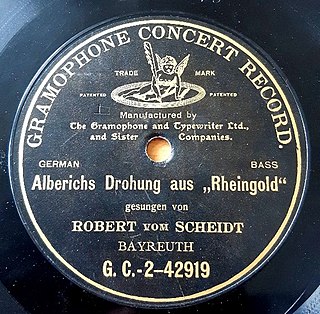
Robert vom Scheidt was a German operatic baritone. He created roles in several world premieres at the Oper Frankfurt, including Wolf in Franz Schreker's Das Spielwerk und die Prinzessin (1913), Vitellozzo Tamare/Andrea in Schreker's Die Gezeichneten (1918), Baliv in Schreker's Der Schatzgräber (1920), and Rabbi Leone in Eugène d'Albert's Der Golem (1926).

Prinzessin Brambilla, Op. 12b, is an opera in a prologue and five scenes by Walter Braunfels. The German libretto, written by the composer, is based on the novella of the same name by E. T. A. Hoffmann published in 1820.
Oberst Chabert is an opera by Hermann Wolfgang von Waltershausen, loosely adapted by the composer from the novel Colonel Chabert by Honoré de Balzac.
Hermann Wiedemann was a German operatic baritone and academic teacher. He was a long-term member of the Imperial Court Opera in Vienna from 1916, where he appeared as Faninal in Der Rosenkavalier by Richard Strauss 196 times, and as Beckmesser in Wagner's Die Meistersinger von Nürnberg 155 times. He was Beckmesser also in a recording from the Salzburg Festival 1937, conducted by Arturo Toscanini. He performed internationally at leading opera houses and festivals, such as the Teatro Colón of Buenos Aires and the Zoppoter Festspiele. He appeared in the world premieres of Wolf-Ferrari's I gioielli della Madonna in Berlin, Busoni's Die Brautwahl in Hamburg, and Lehár's Giuditta in Vienna.


















